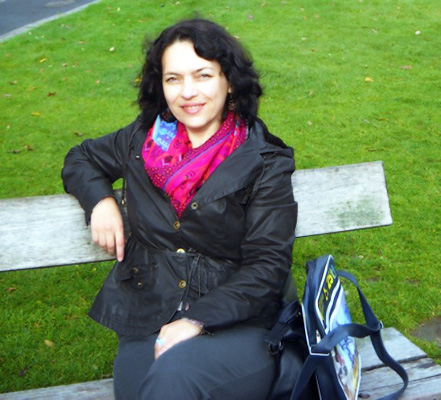Home - GFMER Country Coordinators
Gabriela Tavchioska
GFMER Coordinator for Macedonia

Gabriela Tavchioska, MD, MSc
Pediatrician, Master of Science in the field of Pediatrics
Department of Pediatrics, General Hospital "Borka Taleski", Prilep, Republic of Macedonia
E-mail: gtavcioska@gmail.com
I graduated from the Medical Faculty within Ss. Cyril and Methodius University in Skopje. From 2008 till 2013 I have done a specialization in pediatrics. During the specialization I took part in many courses, meetings and schools where I’ve enriched my knowledge in pediatrics, and public health as well (OMI Salzburg Seminars on General Pediatrics and Pediatric Gastroenterology, GFMER Sexual and reproductive health course 2010, Summer School on ”Public health approach to health of newborn, child and adolescent” in Trieste, 9th Advanced HIV/AIDS Course in Aix-en Province, 24th Meeting of European Academy of Child Disability in Istanbul, Summer School on Public Health Policy, Economics and Management in Lugano, Training courses in pediatric neurology in Sarajevo, Intensive training course at Pediatric Clinic in Zagreb, etc).
In 2011, I obtained a master’s degree at the Medical Faculty in Skopje. The title of my thesis was “Application of clinical system for prediction of risk for early neonatal mortality in General Hospital, Prilep”.
Through my employment history, I gained experiences at all levels of the health system in my country (primary, secondary and tertiary). Driven by a high interest in pediatric neurology and neonatology, I became a member of professional associations such as the European Pediatric Neurology Society, the European Academy of Child Disability, the International Child Neurology Association, and the American Academy of Pediatrics.
Republic of Macedonia - Country profile
Republic of Macedonia is a country located in the Balkan peninsula in Southeast Europe on area of 27 713m2 with population of 2 022 547 inhabitants (2002 census) . It is one of the successor states of the former Yugoslavia, from which it declared independence in 1991. Skopje is the country's capital. In 2004, the Republic of Macedonia was reorganised into 84 municipalities. According to the last census in 2002 in Macedonia live 64,2% Macedonians, 25,2% Albanians, 3,9% Turks, 2,7% Roma, 1,8% Serbs and 2,2% other ethnical groups.
In 2012, estimated GPD per capita was 10,718$. The country economy is in the group of middle-income according to World Bank data.
In 2005, the country was officially recognised as a European Union candidate state.
Country situation of sexual and reproductive health
National strategy for sexual and reproductive health 2010-2020 was developed in 2009 as a result of cooperation between the Ministry of Health, Public Health Institute, UNFPA and NGOs.
This strategy defines the priorities in the field of sexual and reproductive health and its aims are to plan, to mobilize and to coordinate the resources needed for effective actions based on the four main principles: human rights, gender equality, multisectoral approach and communities involvement.
Some indicators for sexual and reproductive health presented in National strategy:
- Fertility rate: 1.46 (2007)
- % of live newborns born by mothers under 19 years: 6.7 (2008)
- Abortion/1000 live born newborns: 26.8 (2008)
- Usage of modern contraceptives: 9.8% (2006)
- Usage of any kind of contraceptive: 13.5% (2006)
- % of woman with antenatal visits during first trimester: 41.7 (2007)
- Average of antenatal visits during pregnancy: 2.8 (2007)
- % of deliveries with professional help: 99% (2008)
- Perinatal mortality/1000 births: 14.6 (2008)
Family planning was not carry out in organized way. Measures in this field mostly are conducted by gynecologists whose outpatient clinics are situated in urban areas and woman who are living in rural areas have limited approach to professional advice and contraceptives. With government assistance as a part of National Strategy for sexual and reproductive health, counseling centers were opened. Free advices, some contraceptives and HIV testing can be obtained in these centers.
Country situation of child health
As a result of continuous investment in education, health care facilities, high tech equipment and experts advices by external counselors, there is positive trend in the field of child health.
Statistical data about this issue are presented in the last MICS.
GFMER and Republic of Macedonia
Only few of health care providers in Macedonia are GFMER members. Because many health care professionals can take benefit from the GFMER online courses, some activities are needed with order to introduce these learning opportunities. Local or country club with GFMER members will be established and social networks will be used to spread the GFMER capacities.
Useful documents and links
- Multiple Indicator Cluster Survey (MICS) in the Republic of Macedonia, 2005-2006
- FYR of Macedonia - Health Equity and Financial Protection datasheet
- Republic of Macedonia Multiple Indicator Cluster Survey 2011
- Ministry of Health, Republic of Macedonia
- UNICEF The former Yugoslav Republic of Macedonia
- State Statistical Office of the Republic of Macedonia
- Macedonia Timeless
- Ss. Cyril and Methodius University in Skopje
- Macedonian Journal of Medical Sciences
- Pediatric Association of Macedonia